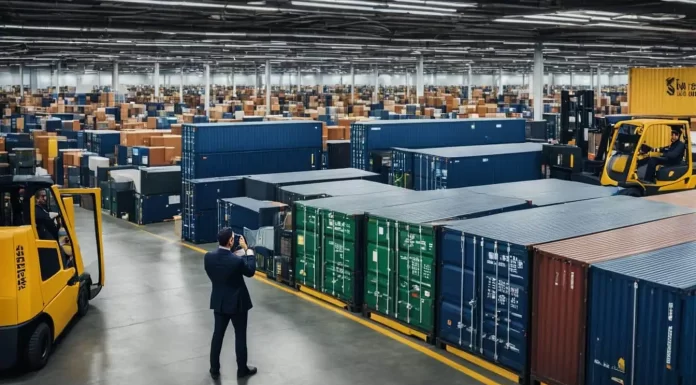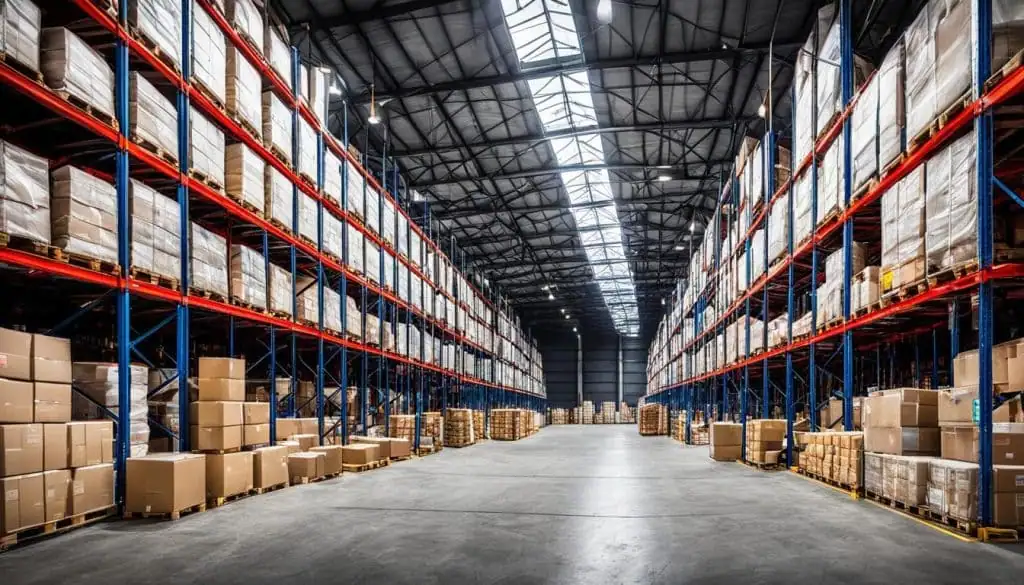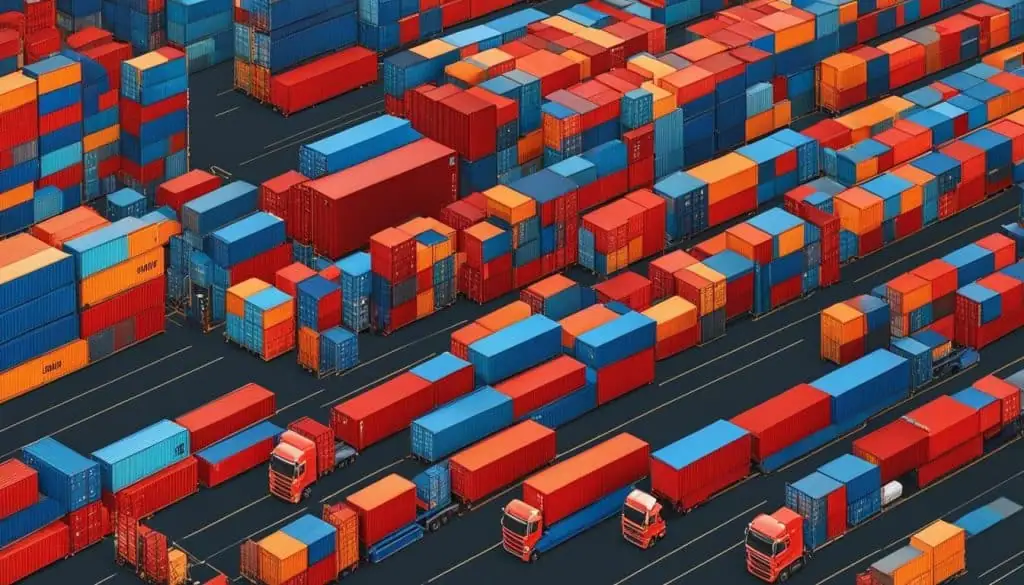Historical Development and Importance in Filipino Trade
Bonded warehouses have played a significant role in the development of Filipino trade throughout history. These warehouses, strategically situated in ports and docks, have facilitated international trade by providing secure storage for imported and exported goods. The importance of bonded warehouses in the Philippines cannot be overstated. They have connected the country to global markets, supported economic growth, and ensured smooth customs clearance processes.
One of the key advantages of using bonded warehouses for businesses is the tax and duty deferral feature. By storing items in bonded warehouses, businesses can defer the payment of customs duties and taxes until the goods are withdrawn for local distribution or export. This deferral allows businesses to optimize their cash flow and improve financial management. Additionally, bonded warehouses streamline international trade processes by providing a centralized location for customs clearance. This reduces import and export complexities, saving businesses time and ensuring compliance with customs regulations.
Furthermore, bonded warehouses offer value-added services such as repackaging, labeling, and quality control inspections, which enhance operational efficiency and facilitate trade operations. These warehouses also implement strict security measures and customs compliance protocols to ensure the safety and integrity of stored goods.
In the following sections, we will explore the various advantages of using bonded warehouses in more detail, including tax and duty deferral benefits, streamlining international trade processes, operational aspects, security measures, inventory management, regulatory requirements, storage limitations, and technological innovations in bonded warehousing. We will also discuss the integration of bonded warehouses with global supply chain networks and examine bonded warehouse solutions available in the Philippines.
Table of Contents

Tax and Duty Deferral Benefits
One of the key advantages of using bonded warehouses for businesses in the Philippines is the tax and duty deferral benefit. When items are stored in bonded warehouses, businesses can defer the payment of customs duties and taxes until the items are withdrawn from the warehouse for local distribution or export. This deferral offers significant financial advantages, allowing businesses to optimize their cash flow and allocate funds more effectively. By deferring tax payments, businesses can allocate resources to other operational needs, such as marketing, research, and development.
The tax and duty deferral benefit provided by bonded warehouses enables businesses to maintain a competitive edge in the market. It reduces the financial burden of upfront duty payments, allowing businesses to allocate resources strategically and invest in growth opportunities. Moreover, by deferring tax liabilities, businesses can ensure better financial planning and control.
Businesses can take advantage of the tax and duty deferral benefit provided by bonded warehouses to harness growth opportunities, expand their product offerings, and enter new markets. By deferring taxes, businesses can preserve liquidity and maintain a strong financial position, enabling them to respond quickly and effectively to market demands and changes.
Streamlining International Trade Processes
Operational aspects play a crucial role in the efficiency and effectiveness of bonded warehousing for international trade in the Philippines. Streamlining these processes contributes to smoother customs clearance, reduced lead times, and improved overall supply chain performance. Let’s explore some key operational aspects of bonded warehousing and their significance.
The Importance of Customs Compliance
Compliance with customs regulations is paramount in bonded warehousing. By adhering to these requirements, businesses can avoid penalties and delays in the movement of goods. Bonded warehouses implement robust systems to ensure accurate documentation, record-keeping, and timely reporting. This enables seamless interactions with customs authorities and supports efficient import and export processes.
Enhancing Security Measures
Security is a top priority in bonded warehouses to protect stored goods from theft, damage, or unauthorized access. Advanced security technologies, such as CCTV cameras, biometric access controls, and intrusion detection systems, are employed to monitor and safeguard the warehouse premises. These measures provide peace of mind to businesses and contribute to the overall integrity of the supply chain.
Efficient Inventory Management
Accurate inventory management is crucial in bonded warehousing to ensure optimal stock levels and minimize discrepancies. Warehouse management systems and automated tracking technologies, such as RFID (Radio-Frequency Identification) and barcode scanning, facilitate real-time monitoring and traceability of inventory. These tools enable businesses to make informed decisions, streamline order fulfillment, and maintain accurate stock records.
Collaboration and Communication
Effective collaboration and communication among stakeholders are vital for smooth trade operations. Bonded warehousing integrates seamlessly into global supply chain networks, leveraging digital platforms and connectivity. This integration allows for real-time information sharing and coordination between businesses, suppliers, customs authorities, and logistics partners. It enables efficient decision-making, reduces administrative complexities, and enhances overall supply chain visibility.
By focusing on these operational aspects, businesses can unlock the full potential of bonded warehousing for international trade in the Philippines. Streamlining processes, ensuring customs compliance, implementing robust security measures, and embracing technological innovations contribute to efficient trade operations, reduced costs, and improved customer satisfaction.
Security Measures and Customs Compliance
Ensuring the security of bonded warehouses in the Philippines is paramount to protect stored goods from loss, theft, and damage. To enhance security, these warehouses implement robust measures and employ state-of-the-art technologies.
Surveillance systems, including CCTV cameras and biometric access controls, are strategically placed throughout the warehouse to monitor and restrict access. In addition, intrusion detection systems are installed to promptly detect and respond to any unauthorized entry attempts.
Proper customs compliance is also crucial for businesses operating in bonded warehouses. Compliance ensures adherence to customs regulations and avoids penalties and disruptions to operations. Bonded warehouses have well-established processes and systems in place to facilitate customs compliance.
The accurate documentation of goods, record-keeping, and timely reporting are key components of customs compliance. This ensures that businesses fulfill the necessary paperwork and declarations required by customs authorities.
By prioritizing security measures and customs compliance, businesses can maintain the integrity of their operations within bonded warehouses and build trust with customers and stakeholders.
Inventory Management and Tracking Systems
Efficient inventory management and real-time tracking systems are crucial in overcoming the challenges faced in bonded warehousing and ensuring smooth operations. The complex nature of bonded warehouses, with multiple items and varying storage requirements, can make inventory management a daunting task. However, with the right systems and strategies in place, businesses can effectively manage their inventory, optimize space utilization, and minimize errors.
One of the main challenges in inventory management is maintaining accurate stock levels and visibility. By implementing inventory control solution, businesses can track the movement of goods in real time, monitor stock levels, and generate reports for better decision-making. Additionally, barcode scanning and RFID technologies play a crucial role in automating the process of inventory counting and tracking. These technologies enable accurate and efficient data capture, reducing manual errors and improving inventory accuracy.
Another challenge in bonded warehousing is the need for efficient tracking systems. With numerous items stored in the warehouse, tracking their location and status becomes essential. Real-time tracking systems, such as GPS and RFID, allow businesses to monitor the movement of goods from entry to exit, ensuring transparency and accountability. This enhances supply chain visibility and enables timely responses to any issues or delays.
Furthermore, having a robust tracking system helps in mitigating risks such as theft, loss, or damage to stored goods. By implementing security features like tamper-evident seals and integrating them with the tracking systems, businesses can enhance the overall security of the warehouse and reduce the risk of unauthorized access.
It is crucial for businesses to continually assess and optimize their inventory management and tracking systems to stay competitive in the bonded warehousing industry. By investing in advanced technologies and employing best practices, businesses can overcome the challenges associated with inventory management and tracking, improving efficiency, accuracy, and customer satisfaction.
Navigating Regulatory Requirements
When it comes to bonded warehousing in the Philippines, navigating regulatory requirements is of utmost importance. To ensure smooth operations and compliance, businesses must stay informed and proactive in meeting the necessary regulations and standards.
One of the key aspects of regulatory compliance is adhering to customs regulations. This involves proper documentation, accurate record-keeping, and timely reporting. By maintaining meticulous records and fulfilling customs requirements, businesses can avoid penalties and unnecessary delays in their supply chain.
In addition to customs regulations, businesses also need to stay updated on tax laws and other relevant regulations that affect bonded warehousing. This includes understanding tax implications and ensuring timely payments to maintain compliance. Seeking guidance from legal and financial experts can help businesses navigate these complex regulations effectively.
Collaborating with logistics solutions providers who have extensive knowledge and experience in bonded warehousing can be invaluable. These providers can offer insights and guidance in meeting regulatory requirements, ensuring seamless operations within the framework of the law.
By placing a strong emphasis on regulatory compliance and proactively managing the necessary requirements, businesses can navigate the complexities of bonded warehousing in the Philippines with confidence, minimizing risks and optimizing their operations.
Addressing Storage Limitations and Efficiency
In bonded warehousing, efficient storage management is key to maximizing operational efficiency and addressing storage limitations. Technological innovations have played a crucial role in revolutionizing the way warehouses manage their storage space and optimize efficiency in the Philippines.
One of the advancements is the implementation of automated storage and retrieval systems (AS/RS). These systems utilize robotic technology to efficiently store and retrieve goods, minimizing human error and optimizing the use of vertical space. AS/RS can handle large volumes of inventory quickly and accurately, reducing the need for extensive manual labor.
Furthermore, the use of intelligent inventory management systems provides real-time visibility and control over stock levels. These systems utilize technologies such as RFID tagging and barcode scanning to accurately track and monitor inventory movements. By having accurate and up-to-date information on inventory levels, businesses can optimize storage space, minimize carrying costs, and ensure timely replenishment.
Another technological innovation that addresses storage limitations is the adoption of cloud-based warehouse management systems (WMS). These systems enable businesses to efficiently manage their warehousing operations by providing centralized control and real-time data access. WMS allows for streamlined order processing, inventory tracking, and warehouse layout optimization.
Beyond storage management, technological innovations have also enhanced other aspects of bonded warehousing operations, such as order fulfillment and transportation management. The use of automated picking systems, robotic sorting, and efficient routing algorithms has improved order accuracy, speed, and overall customer satisfaction.
In conclusion, the adoption of technological innovations in bonded warehousing in the Philippines has brought significant improvements in addressing storage limitations and optimizing efficiency. AS/RS, intelligent inventory management systems, cloud-based WMS, and other advancements have revolutionized the way warehouses manage their storage space, ensuring optimal utilization and streamlining operations.
Advancements in Security and Tracking Technologies
Advancements in security and tracking technologies have revolutionized the bonded warehousing industry, enhancing the safety and efficiency of operations. These technologies enable businesses to protect stored goods and ensure secure handling throughout the supply chain.
One notable advancement is the implementation of advanced surveillance systems. Closed-circuit television (CCTV) cameras, combined with biometric access controls and intrusion detection systems, provide robust security measures to safeguard the integrity of the stored inventory. These systems enable real-time monitoring and alerts, ensuring timely response to any potential security threats.
Tracking technologies, such as RFID (Radio-Frequency Identification) and barcode scanning, offer accurate and efficient inventory management. With RFID tags or barcodes attached to each item, businesses can easily track and trace the movement of goods within the warehouse. This enhances inventory visibility and enables real-time stock management, reducing the risk of errors and improving order fulfillment processes.
Moreover, the integration of global positioning systems (GPS) in transportation vehicles allows businesses and logistics providers to track the location of shipments in real-time, ensuring timely deliveries and providing customers with accurate information about their orders.
These advancements in security and tracking technologies provide businesses in the Philippines with enhanced control and visibility over their inventory, minimizing the risk of theft, loss, and counterfeiting. By leveraging these technologies, businesses can optimize their operations, improve customer satisfaction, and gain a competitive edge in the global market.
Integration with Global Supply Chain Networks
As businesses in the Philippines embrace the opportunities presented by international trade, integration with global supply chain networks becomes crucial. The seamless flow of goods and information across borders contributes to the efficiency and competitiveness of bonded warehousing.
One of the key aspects of integration is leveraging technological advancements. Bonded warehouses are adopting digital platforms and connectivity to enhance collaboration with suppliers, customs authorities, and other stakeholders. This connectivity enables real-time information sharing, streamlined documentation, and improved visibility throughout the supply chain.
To further enhance integration, tracking technologies play a vital role. RFID (Radio-Frequency Identification) and barcode scanning enable the real-time tracking and traceability of inventory. These technologies ensure accurate and efficient movement of goods within the warehouse and facilitate smooth customs procedures.
Moreover, the integration of bonded warehouses into global supply chain networks enables businesses to tap into a wider range of suppliers, customers, and markets. This expanded network provides opportunities for growth and diversification, helping businesses in the Philippines stay competitive in the global marketplace.
By integrating with global supply chain networks, businesses can optimize their operations, reduce costs, and improve customer satisfaction. The interconnectedness of bonded warehouses with the global market creates a seamless flow of goods, enabling businesses to meet the demands of international trade efficiently.
Are you looking for efficient and secure storage solutions for your business in the Philippines? Look no further than bonded warehouse solutions. Bonded warehouses offer a range of benefits that can significantly streamline your international trade operations and enhance your supply chain efficiency.
When it comes to bonded warehouse solutions in the Philippines, you have various options to choose from. Private warehouses are ideal for established businesses that have the resources to build and maintain their own storage facilities. Public warehouses, on the other hand, are owned by the government or semi-government bodies and are suitable for smaller businesses that require cost-effective storage solutions.
Bonded warehouses, owned and managed by government and private agencies, are specifically designed to manage imported and exported items while ensuring tax compliance. These warehouses provide secure and duty-deferred storage, allowing you to optimize your cash flow and improve your financial management.
One of the key advantages of using bonded warehouses in the Philippines is the streamlining of international trade processes. These warehouses serve as centralized locations for customs clearance, reducing the time and complexity of importing and exporting goods. They also offer value-added services such as repackaging, labeling, and quality control inspections to facilitate smooth trade operations.
Moreover, bonded warehouses implement strict security measures to ensure the safety and integrity of stored goods. They comply with customs regulations, maintain accurate documentation and record-keeping, and utilize advanced tracking systems for efficient inventory management.
As businesses navigate the regulatory requirements and storage limitations associated with bonded warehousing, technological innovations come to the forefront. Advancements in security technologies and tracking technologies enhance the overall efficiency and competitiveness of bonded warehousing in the Philippines.
By integrating with global supply chain networks, bonded warehouses leverage digital platforms and connectivity for seamless information sharing and collaboration with suppliers, customs authorities, and other stakeholders.
Whether you need temporary storage or long-term solutions, bonded warehouse solutions in the Philippines are designed to meet your business needs. Take advantage of the strategic location, tax benefits, and streamlined trade processes to optimize your operations and drive success in the global marketplace.
Introduction to Bonded Warehousing in the Philippines
Bonded warehousing in the Philippines has a long history and plays a crucial role in Filipino trade. The concept of bonded warehouses dates back to the Spanish colonial era when these warehouses were established to facilitate international trade. These warehouses were strategically located in ports and docks to receive goods from foreign suppliers.
Today, bonded warehouses continue to be an important part of the logistics infrastructure in the Philippines, providing secure storage facilities for imported and exported items. They ensure that private companies pay the necessary taxes on time and comply with customs regulations.
The development of bonded warehousing has contributed to the growth of the trade sector in the Philippines, connecting the country with global markets and supporting economic development.
Advantages of Using Bonded Warehouses for Businesses
Using bonded warehouses in the Philippines offers several advantages for businesses. One of the key benefits is the tax and duty deferral feature. Items stored in bonded warehouses are not subject to immediate payment of customs duties and taxes. This allows businesses to defer their tax liabilities until the items are withdrawn from the warehouse for local distribution or export. By deferring these payments, businesses can optimize their cash flow and improve their financial management.
Another advantage of bonded warehouses is the streamlining of international trade processes. These warehouses provide a centralized location for customs clearance, reducing the time and complexity of importing and exporting goods. They also offer value-added services, such as repackaging, labeling, and quality control inspections, to facilitate smooth trade operations.
In addition, bonded warehouses provide businesses with secure storage facilities. These warehouses implement robust security measures to safeguard stored goods against theft, damage, or unauthorized access. With strict access controls, surveillance systems, and trained staff, businesses can have peace of mind knowing that their inventory is protected.
Furthermore, using bonded warehouses supports international trade by promoting efficient supply chain management. With bonded warehouses strategically located near ports and transportation hubs, businesses can easily access import and export markets. This proximity reduces transportation costs and lead times, enabling businesses to respond quickly to market demands and maintain a competitive edge.
Overall, the advantages of using bonded warehouses for businesses in the Philippines include tax and duty deferral, streamlined international trade processes, secure storage facilities, and enhanced supply chain management. By leveraging these benefits, businesses can optimize their operations, improve cash flow, and position themselves for success in the global marketplace.
To discover the best solution for your business, explore the HashMicro ERP software. Check out our pricing plans below and find the package that perfectly suits your needs.

Operational Aspects of Bonded Warehousing
Efficient operation of bonded warehouses in the Philippines requires careful consideration of several key aspects, including security measures, customs compliance, inventory management, and tracking systems. These operational factors are critical in ensuring the smooth functioning of bonded warehouses and the successful management of stored goods.
One of the primary focuses of bonded warehouses is the implementation of robust security measures to protect the integrity and safety of stored goods. These measures include the use of advanced surveillance systems, such as CCTV cameras, to monitor the warehouse premises. Access controls, such as biometric identification systems, are also employed to restrict entry to authorized personnel only. Additionally, trained staff play a crucial role in maintaining security by overseeing the handling and storage of goods, ensuring compliance with security protocols.
Compliance with customs regulations is another vital aspect of bonded warehousing. With a significant emphasis on customs compliance, bonded warehouses adhere to well-established processes and guidelines set by customs authorities. Accurate documentation, record-keeping, and timely reporting are essential practices followed within these warehouses to ensure compliance with customs requirements. It is crucial for businesses utilizing bonded warehousing services to align their operations with customs regulations to avoid penalties and delays.
Efficient inventory management is key to optimizing warehouse operations. Bonded warehouses employ tracking systems that enable real-time monitoring of inventory levels. These systems facilitate effective order fulfillment by providing accurate information about available stock. Additionally, these tracking systems play a crucial role in customs and regulatory compliance, enabling accurate reporting of inventory for auditing and documentation purposes.
To enhance the efficacy of operations, bonded warehouses utilize state-of-the-art tracking systems. These tracking systems employ technologies such as RFID (Radio-Frequency Identification) and barcode scanning to enable real-time tracking and traceability of goods within the warehouse. This allows for efficient inventory management and order processing, streamlining overall operations.
Challenges in Bonded Warehousing and Mitigation Strategies
Bonded warehousing in the Philippines presents several challenges that businesses must overcome to ensure efficient operations. One of the main challenges is navigating the complex regulatory requirements associated with bonded warehousing. To meet these requirements, businesses must remain updated on customs regulations, tax laws, and other relevant regulations. This necessitates close collaboration with logistics solutions providers to ensure compliance and avoid penalties or disruptions to operations.
Another major challenge in bonded warehousing is addressing storage limitations and optimizing efficiency within warehouse operations. As the demand for bonded storage space increases, warehouses often face constraints in available space. To overcome this challenge, businesses can implement efficient storage systems such as vertical racking and space optimization strategies. Additionally, embracing technology, such as warehouse management systems and automation, can greatly enhance efficiency in inventory management and order processing.
Technological Innovations in Bonded Warehousing
Technological advancements have revolutionized the bonded warehousing industry, bringing about significant improvements in security and tracking capabilities. Warehouse operators in the Philippines are now leveraging advanced surveillance systems to enhance security measures and protect stored goods. This includes the implementation of state-of-the-art CCTV cameras, biometric access controls, and intrusion detection systems. These cutting-edge security technologies ensure that your inventory is safeguarded and minimize the risk of theft or unauthorized access.
Furthermore, the integration of tracking technologies such as RFID (Radio-Frequency Identification) and barcode scanning has transformed inventory management in bonded warehouses. These tracking systems enable real-time tracking and traceability of your items, providing accurate and up-to-date information on their location and status. With improved visibility and control over your inventory, you can optimize your warehouse operations, enhance order fulfillment efficiency, and meet customer demands more effectively.
Bonded warehouses in the Philippines are also embracing digitalization and connectivity to integrate into global supply chain networks. Through digital platforms and connectivity, they enable seamless information sharing and collaboration with suppliers, customs authorities, and other stakeholders. This integration enhances the flow of goods and information across the supply chain, improving overall performance and delivering greater value to your business. By leveraging these technological innovations, you can enhance the competitiveness and efficiency of your bonded warehousing operations, ensuring a smooth and streamlined trade process.
























